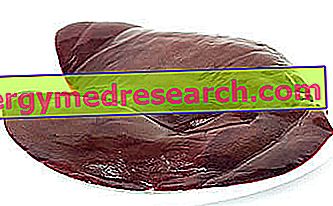Nutritional properties
Nutritional properties of canned mackerel and comparison with fresh one
Poor fish in name only but not in fact, mackerel is a food of great nutritional value and sustainability (ecological and economic).
Mackerel is a worthy exponent of the 1st fundamental group of foods and constitutes an optimal source of noble proteins. Moreover, belonging to the group of blue fish, it provides excellent quantities of omega 3.

To be more precise, mackerel is to be considered a primary source of:
- Noble proteins : better known as high biological value proteins, they contain all the essential amino acids for humans in the right quantities.
- Omega 3 eicosapentaenoic acid (EPA) and docosahexaenoic acid (DHA) : they are fats that the body is not able to produce completely independently; of great importance for health, they are fundamental for the development of the fetus, for the good functioning of the nervous and ocular tissue, to reduce systemic inflammation, for the maintenance of the general state of health, for the prevention of metabolic pathologies (especially hypertension and hypertriglyceridemia) and vascular.
- Vitamin D, vitamin A, vitamin B2 and vitamin B12 : vitamin D is necessary for maintaining bone health, vitamin A is necessary for visual function and acts as an antioxidant, vitamin B2 is an enzyme factor necessary for cellular respiration, the vitamin B12 allows the maturation of red blood cells and the nervous development of the fetus.
- Mineral iodine : fundamental to the thyroid function, in turn appointed to regulate the basal metabolism of the whole organism.
On the other hand, mackerel is a product of the sea and, although Italy is a peninsula, the commercial network is not efficient enough to supply all fresh fish locations equally. Furthermore, mackerel is not a food that resists brilliantly freezing (especially at home) after which, objectively, it worsens flavor.
The contemporary lifestyle, increasingly frantic, and the loss of interest in domestic activities also contribute to compromising the consumption of mackerel. In fact, year after year the time devoted to family cooking is progressively reduced, with greater penalization of recipes that require more time and experience.
Another objectively limiting factor for the consumption of mackerel is the presence of children in the family unit, which require great attention to the removal of bones and a certain imagination in the proposal of the recipes.
In short, for one reason or another, the chances of eating a good dish of mackerel do not hint to increase but, given the nutritional value of this food, it is necessary to adopt a trend reversal. So how can these problems be solved?
Canned mackerel
The most important characteristic of canned mackerel consists of a nutritional profile almost identical to that of fresh fish. Thanks to a particular attention to the times, to the treatment conditions and to the cooking, the levels of noble proteins, omega 3 and not only remain unchanged.
As if this were not enough, to the delight of mothers, the bones of canned mackerel are removed by hand to ensure greater safety. The food is offered natural or in oil, also delicately grilled, and / or flavored with olives, barbecue sauce and spicy.
In practice, canned mackerel offers only advantages and no disadvantages with regards to taste, practicality and nutritional richness.
Importance in the Mediterranean diet
Because of globalization and changing daily rhythms, the Italian people are forgetting many of the nutritional habits that once characterized the Mediterranean diet. It means that, wanting to restore this diet, it is necessary to dust off traditional recipes, establish a frequency of consumption and a portion to be assigned to each product.
The use of Mediterranean foods must respect a logic established by their dietary function; in this regard, the already mentioned classification of the 7 fundamental food groups (established by INRAN and SINU) helps us, in which the fish is placed in 1st position.
The most "characteristic and specific" nutrients of mackerel are 4:
- Noble proteins
- Omega 3
- Iodine
- Vitamin D.
Without taking anything away from other nutrients (which are also of vital importance), it simply means that the intake of fresh mackerel, but also canned, is particularly useful to cover these needs.
It must however be admitted that the demand for vitamin D is largely satisfied by the autonomous production of the organism; also, egg yolks and mushrooms are food sources of vitamin D.
In contrast, iodine, EPA and DHA (contrary to what happened in the Mediterranean diet) have become extremely rare nutrients. It is probably the only three nutrients that most of the western population does not take in adequate amounts. Although the body can derive a part from alpha linolenic acid (vegetable omega 3), studies show that this function is not always proportionate to the actual metabolic need. Since they have many vital functions, it is advisable to introduce them in significant quantities also with the diet.
Fortunately, the mackerel is particularly rich and its regular consumption decreases the risk of nutritional deficiency. The availability of canned mackerel, which as we have said uses the same nutritional characteristics, can be of great help in restoring the consumption of blue fish rich in iodine, EPA and DHA typical of the Mediterranean diet.
Regarding proteins, the Mediterranean philosophy recommends a moderate use and almost always equal to or less than 100 g / day. Day by day it is therefore necessary to carefully select the protein source to be used based on the biological value and other nutrients that characterize the food. Canned mackerel proteins have the same biological value as fresh protein and, thanks to perfect cooking, are extremely digestible. Moreover, thanks to the greater satiating power, the noble proteins of the fish are particularly indicated in slimming therapies.
All these considerations lead the Mediterranean nutrition experts to establish that the fish should be consumed 2-3 times a week in variable portions that depend on the subjective request (50-150g). In particular, canned mackerel lends itself to composing small or large dishes, protein snacks, filling for sandwiches and accompanying sauces for pasta dishes.
The packs are comfortable, easily manageable and the variety of tastes allows you to repeatedly change recipes and menus without ever getting tired.



